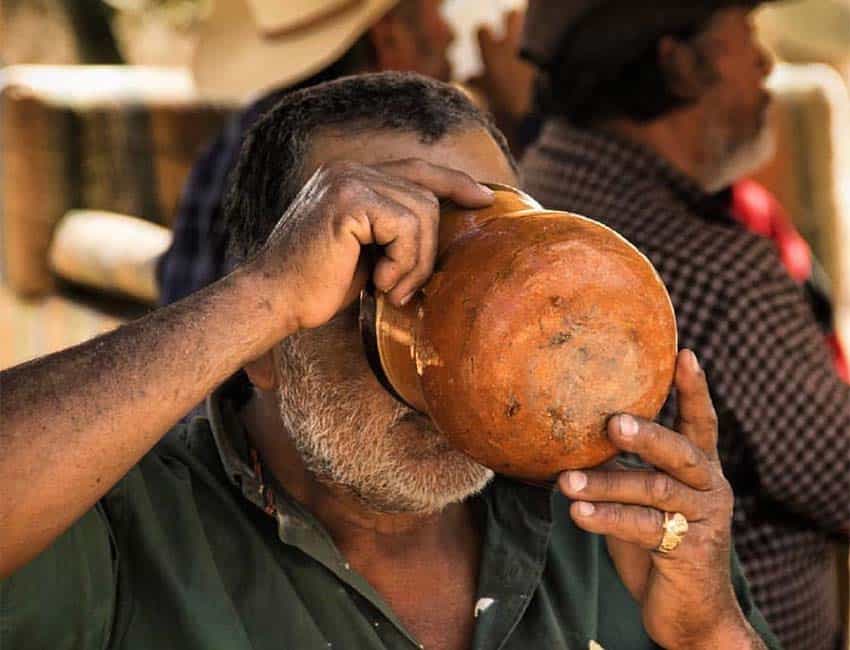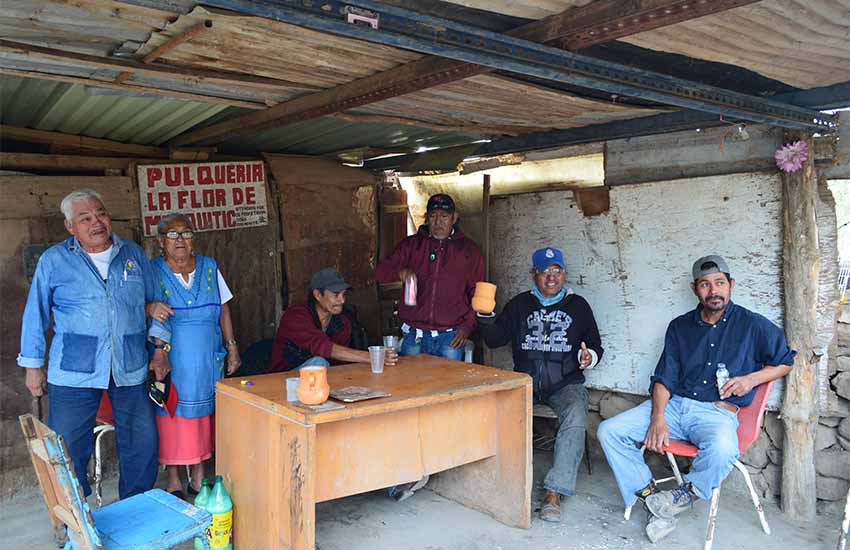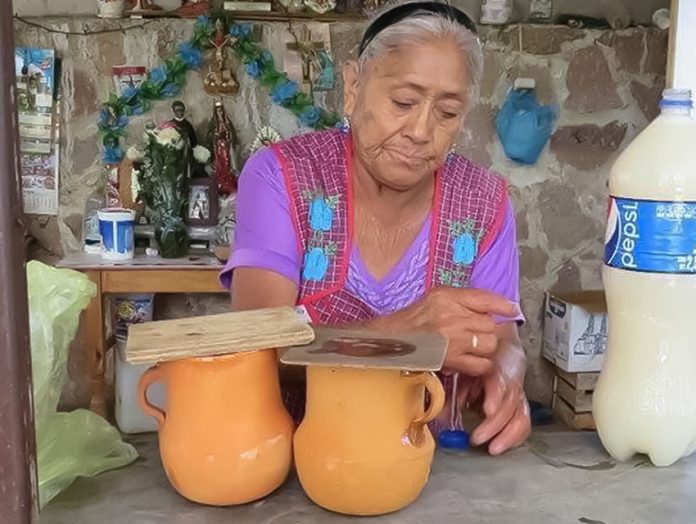The newspaper El Universal calls her San Luis Potosí’s “queen of pulque.” Her real name is María Crescencia Ortiz Hernández, but everyone calls her Doña Chencha, out of both familiarity and respect.
Her claim to fame is a small pulquería (pulque bar) called La Flor de Mexquitic in Maravillas, a San Luis Potosí community in the Mexquitic de Carmona municipality. The state capital is only a 20-minute drive from here, and urbanization is making its way here fast.
All the seating is outdoors or semi-outdoors, allowing you to enjoy the agaves, trees and surrounding farmland. Two local artists and I arrived on a Wednesday to find it nearly empty with just La Doña and a table filled with local regulars.
But this tranquility belies the fact that pulquerías in Mexico have every bit the dangerous reputation that biker bars do in the United States. Owning and running a pulque bar is not for the faint of heart. Nevertheless, Doña Chencha an 80-year-old woman, will tolerate no shenanigans. This becomes obvious when you enter, where there is a prominent sign warning, “If you come looking to fight, you will be thrown out.”

Doña Chencha speaks bluntly and directly and has absolutely no problem adding cuss words to make her point; she does not care what anyone thinks of her. When we asked her how she deals with unruly customers, she pulled out a small knife.
However, there is more to her story. Over the time we spent at the pulquería and talked to her, it became very obvious that she has a well-established relationship with the farm and construction workers that sat at the table for regulars. At first, they were tense, clearly wanting to know what these strangers wanted with her, then relaxed as the Doña did.
There is no doubt that these gentlemen (and they are gentlemen in their own way), would never hesitate to back Doña Chencha up. She is full of anecdotes, including one where she and the regulars threw out a woman who was threatening them as “the girlfriend of a local narco.”
She comes from a family that’s made pulque for several generations. She was already helping at the tender age of nine, and by age 17, was preparing her own batches to sell.

For many years, she was a housewife, but when her husband died in 1982, she needed a way to make a living, so she turned back to what she knew: she established a pulquería on the land her husband left her. She had the full support of her family, and even today, many of her children and grandchildren set up stands in and around the bar to sell food to the crowds that come on weekends.
But despite being tough enough to keep a lid on the rowdiness that pulquerías are famous for, Doña Chencha is not invincible: thank goodness I made the trip out there with two local artists, Marissa Martínez and Eduardo Santillan: first of all, she had difficulty understanding my foreign accent, but when Martínez explained that I wanted to interview her, Chencha at first insisted that she “…didn’t have the vocabulary…” to do something like that.
Had I been there alone, I simply would have drunk a pulque to be polite and then left her in peace. But we sat at one of the tables and my two companions began to draw Doña Chencha into conversation about her life and the bar. At first, the answers were short as she passed by, but she eventually sat with us to chat. What would have been an awkward half-liter of pulque turned into a jovial experience for everyone, La Doña included.
La Flor de Mexquitic has managed to keep most of its rural, rustic charm. It is open everyday, but the best time to go for most people is on weekends, when it fills up with people from all over, including families. On weekends, there are not only pulques flavored with whatever fruits are in season but also a variety of homemade local foods. When available during its very short season in late summer, you can even find colonche, a fermented prickly-pear beverage.

But don’t wait too long to visit: as much as La Flor de Mexquitic is a local institution, its future is in doubt.
Doña Chencha is in good health, and even if retirement were an option, I doubt she would take it. But she is 80 years old. She has 10 children (not sure how many grandchildren she has), but despite the support from her family, there isn’t the same interest in making pulque among the younger generations.
She doesn’t blame them: they have educational and career opportunities that were unthinkable in her time.
- To get directions to Doña Chencha’s pulquería, enter “Pulquería La Flor de Mexquitic” into Google.
Leigh Thelmadatter arrived in Mexico 18 years ago and fell in love with the land and the culture in particular its handcrafts and art. She is the author of Mexican Cartonería: Paper, Paste and Fiesta (Schiffer 2019). Her culture column appears regularly on Mexico News Daily.
